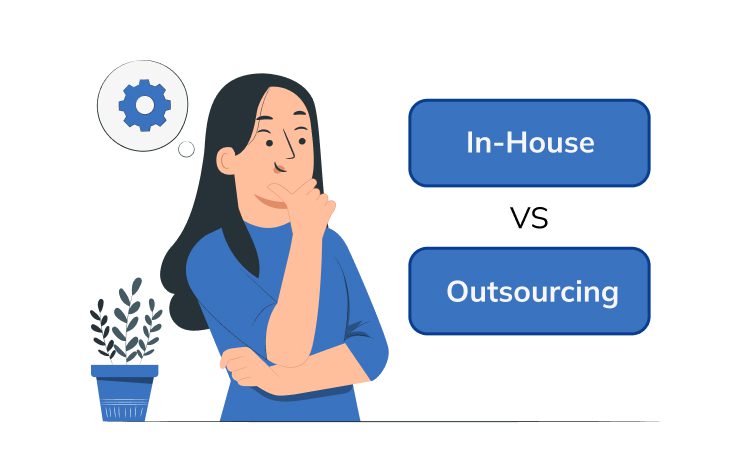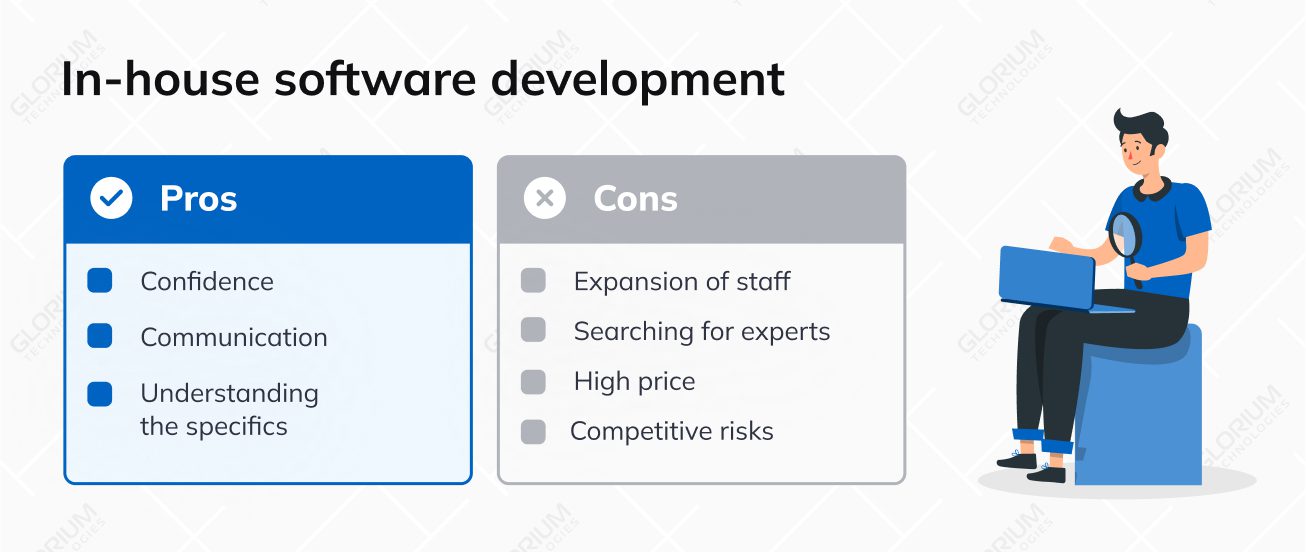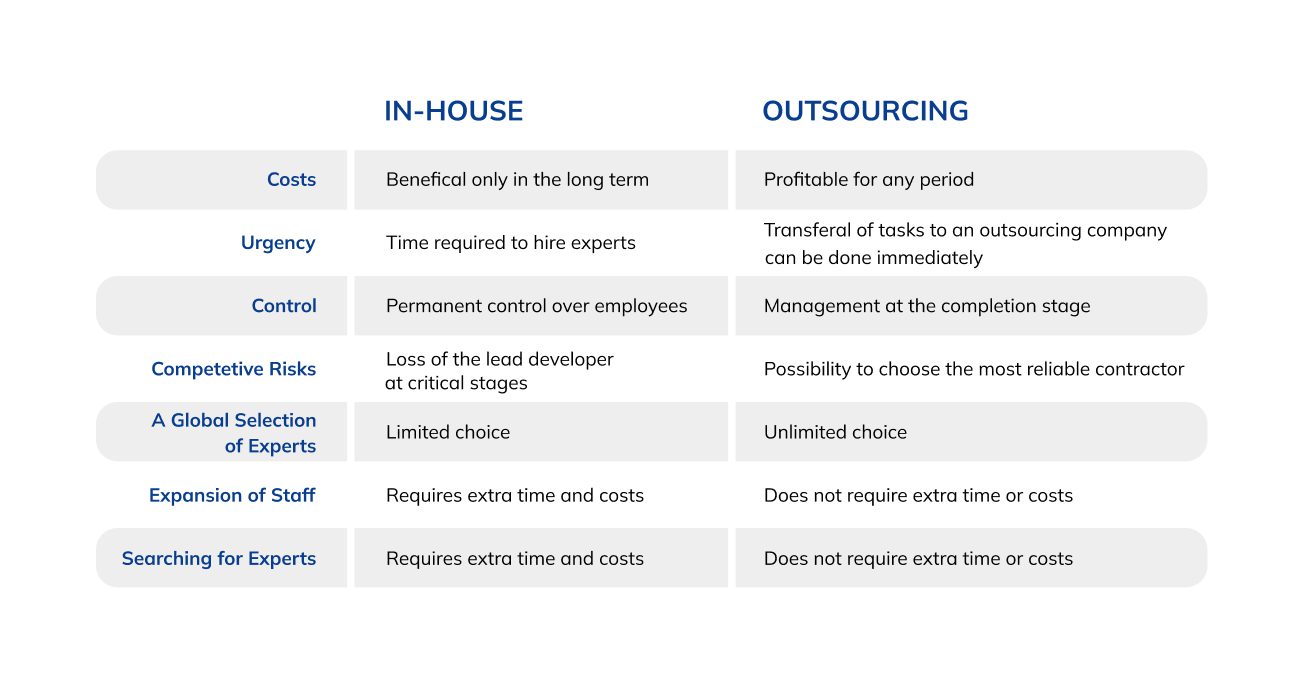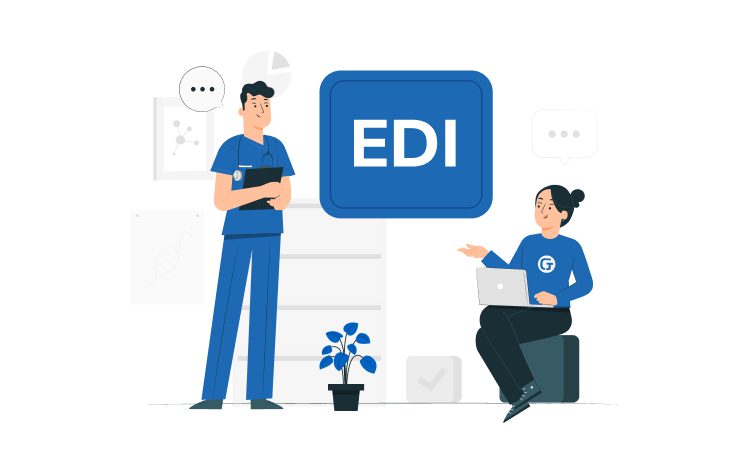
In-House vs. Outsourcing: Which Software Development Method to Choose



Sophisticated software development is vital for both startups and established companies. As organizations seek to harness the benefits of technology, a fundamental question arises—should they choose in-house software development or opt for outsourcing?
The reason for such active growth is budget savings and flexibility in work. 70% of surveyed companies say they choose outsourcing because of the opportunity to reduce development costs and get a ready-to-go solution in a short time. At the same time, a number of companies hold strong to in-house software development.
By understanding the nuances of in-house vs outsourcing development methods, businesses can make informed choices that align with their unique needs, goals, and resources. We hope our honest guide helps you connect the dots.
In-house software development refers to the practice of having an organization’s own internal team or department responsible for designing, building, and maintaining software applications or solutions to meet their specific needs.
Outsourcing involves delegating the design, development, and maintenance of software applications or solutions to external third-party companies or professionals, rather than relying on an organization’s internal team.
Content
In-house development involves hiring the team with the necessary skills to work internally in the company. With an in-house team, you can track and control work processes, and monitor the efficiency and growth of employees more closely.
In-house software development also requires an office or infrastructure with all hardware and software. So let’s take a closer look at the pros and cons of in-house development.

In-house software development offers greater control and communication, while fostering collaboration and knowledge retention, leading to enhanced innovation and competitive advantage.
The challenges of in-house software development include building and retaining a skilled team, longer development cycles, keeping up with technological advancements, potential project tunnel vision, and managing unexpected events effectively.
Hiring new employees instead of remote ones may initially seem like a good idea. But the process of finding specialists causes some difficulties. Attracting qualified developers, explaining your needs, and getting the most out of your future employee takes a lot of time and effort.
Hiring several IT specialists in a company involves financial expenses and material support for future employees: office furniture, equipment, etc. But hiring developers is just right for you if you do not have budget constraints and there is room for a whole team in the office.
In-house specialists are more cost-effective if you need complete control over the project. Thus, you will constantly coordinate the work and solve problems or difficulties in development together with the team.
We have an expert article on this topic: Outsourcing vs. Offshoring – What Works Best for You?
To find the right specialist, you should pay attention to specialized online resources and various technical events. Let us consider them in detail.

Recruiting Internet services
You can start your search on general job sites and more narrowly focused ones. The second option, a priori, contains more profiles of development specialists. So you will have more suitable candidates to choose from, regardless of who you are looking for: a backend developer, a designer, or a tester.
Hackathons and IT conferences
These technical events attract hundreds of developers from all over the world. Every year a calendar of conferences is compiled. Each event is often dedicated to one programming language or a certain technology. For example, attend a Java conference if you are looking for a Java developer. It works the same way with other professionals.
Hackathons are also divided by specific technologies. They are good for finding software engineers because they gather experts working on general software around them. A hackathon is a perfect place to find a qualified engineer for your startup. By focusing on the direction of the event, you can choose the one that best suits your project.
Universities
You can find really talented programmers among engineering students. They may not have work experience, but most are great at development tasks. There is a lot of enthusiasm in such candidates, as well as a strong desire to develop in programming. This makes it possible to quickly train them in the right direction and get a great person on the internal team.
When recruiting specialists for your development team, you should be guided by several rules:
The concept of outsourcing involves the transfer of particular responsibilities and tasks to a third-party contractor. Thus, the customer company receives those services and in turn, the contractor company ensures the high-quality execution of tasks assigned to it by a team of its specialists.
When it comes to outsourcing software development, effective communication between the customer and the contractor team becomes paramount. In this setup, the client company interacts with the project manager of the contractor company, who serves as the central point of contact. The project manager takes on the responsibility of addressing all issues raised by the client and ensures seamless coordination between the two parties.
Once the client communicates their requirements and objectives to the project manager, it is the manager’s role to distribute tasks among their team of specialists and closely monitor their progress. This arrangement allows the client to have a single point of contact and relieves them of the burden of directly overseeing every aspect of the development process.
By entrusting the project manager to facilitate communication and manage the team, the client can focus on other strategic aspects of their business while maintaining a clear line of collaboration.
Outsourcing development offers cost savings, access to specialized skills, faster time-to-market, and a focus on core business activities. It also provides flexibility and scalability for adapting to market changes effectively.

The challenges of outsourcing software development include communication barriers, time zone differences, quality and security concerns, intellectual property issues, vendor dependency risks, and potential cultural clashes.
When discussing the pros of outsourcing, we found that working with an outside team is financially more beneficial. This option is suitable for those who have a limited budget. Delegating the development to an outsourcing company will allow you to get a reliable product at a low cost, as compared to hiring your own team.
In-house development involves an internal team of developers, providing direct control and in-depth knowledge of the product, but can be costly and limited in specialized skills. On the other hand, outsourcing offers cost savings, access to specialized expertise, and scalability, but communication challenges and time zone concerns may arise.
The choice between in-house vs outsourcing depends on the project’s nature, budget, required skills, and long-term goals. A hybrid approach can be considered to strike a balance between control and cost-effectiveness.
Anna VoznaClient Success Manager, Glorium Technologies
Outsourcing is preferred by those companies that need to get a solution in a short time. Here we should also mention the difficulty of selecting a personal team. You may simply not have the right specialist in your city. An outsourcing company gives you access to talents from all over the world.
Another case when outsourcing development is preferable is the lack of logistics in the company. The IT service provider has everything you need for each specialist to be productive. Therefore, as a client, you do not need to worry about technical resources.
Before you begin your search, it’s important to determine the right outsourcing model. You can choose from three types of collaboration:

Onshore – the outsourcing company is located in your country but may be headquartered in another city. With this model, the problem of cultural differences is leveled out.
Nearshore – the IT service provider is located in a country close to yours. It is usually in the same time zone as you. This solves the problem of organizing communication.
Offshore – the vendor is located in a different time zone.
After deciding on a cooperation model, choose a way to search for outsourcers. This can be either an online platform or word of mouth. But first things first.
Outsourcing teams have an extensive online presence. Therefore, finding an outsourcing company is not much of a problem. All that remains is to look at the candidates you find and decide who will handle the implementation of your business project better.
After considering the strengths and weaknesses of your own team and the remote team, let’s look at the peculiarities of their activities at different stages of cooperation.
Based on what we have presented above, we have compiled a comparative table, “In-House vs. Outsourcing Development,” which clearly shows the effectiveness of both methods.

Based on this, for companies that are not focused on information technology and do not have competent IT specialists on their staff, it is better to choose outsourcing, entrusting all the work to outside professionals.
Outsourcing takes over most of the planning and execution of your workload, thereby freeing up your efforts to focus on the tasks that require your attention.
By choosing outsourcing, you can grow your business in an unstable market without any significant risk. Glorium has been a reliable provider of the best software development solutions for over 10 years, so if you need a trustworthy outsource partner, let’s get in touch.
In-house software development refers to the process of creating and maintaining software applications within an organization or company. Instead of outsourcing the development work to external software vendors or contractors, the organization establishes its own team of developers who are responsible for designing, coding, testing, and deploying software solutions.
Outsourcing development refers to the practice of hiring external companies or individuals to handle software development tasks or projects on behalf of an organization. Instead of relying solely on an in-house development team, the organization delegates some or all of the software development activities to external parties, commonly referred to as software development outsourcing vendors or contractors.
The benefits of in-house software development include greater control, direct communication, intellectual property protection, knowledge retention, long-term cost efficiency, agility, flexibility, and alignment with organizational culture.
The benefits of outsourcing software development include access to specialized expertise, cost savings, scalability, faster development timelines, reduced management overhead, and the ability to focus on core business functions.
You may need an in-house team when software development is a core competency, for long-term projects, when deep domain knowledge is required, or for intellectual property protection.
You may need to consider outsourcing software development when you require specialized expertise, want to reduce costs, need to scale quickly, have resource limitations, or want to focus on core business functions.
The cost of hiring an in-house development team can vary significantly based on factors such as location, experience level, team size, benefits, and other overhead expenses. It is recommended to conduct market research and consider these factors to estimate the specific costs for your organization.
The cost of outsourcing software development can vary widely depending on factors such as project complexity, scope, vendor location, experience level, and engagement model. It is recommended to obtain quotes from potential vendors and negotiate pricing based on your specific project requirements.
Outsourcing can be safe if proper precautions are taken. It is important to carefully select reliable and reputable outsourcing vendors, establish clear contractual agreements, define data security measures, and maintain effective communication throughout the project. Adhering to industry best practices and conducting due diligence can help mitigate risks and ensure a safe outsourcing experience.
Absolutely. Glorium Technologies is a leading software development company dedicated to fostering the growth of both our clients and team members, empowering them to reach their most ambitious goals.
We have successfully transformed over 100 ideas into reality since 2010. Whether you need custom software development, web and mobile applications, or growth marketing, we take you through the entire journey.









| Cookie | Duration | Description |
|---|---|---|
| cookielawinfo-checkbox-analytics | 11 months | This cookie is set by GDPR Cookie Consent plugin. The cookie is used to store the user consent for the cookies in the category "Analytics". |
| cookielawinfo-checkbox-functional | 11 months | The cookie is set by GDPR cookie consent to record the user consent for the cookies in the category "Functional". |
| cookielawinfo-checkbox-necessary | 11 months | This cookie is set by GDPR Cookie Consent plugin. The cookies is used to store the user consent for the cookies in the category "Necessary". |
| cookielawinfo-checkbox-others | 11 months | This cookie is set by GDPR Cookie Consent plugin. The cookie is used to store the user consent for the cookies in the category "Other. |
| cookielawinfo-checkbox-performance | 11 months | This cookie is set by GDPR Cookie Consent plugin. The cookie is used to store the user consent for the cookies in the category "Performance". |
| viewed_cookie_policy | 11 months | The cookie is set by the GDPR Cookie Consent plugin and is used to store whether or not user has consented to the use of cookies. It does not store any personal data. |